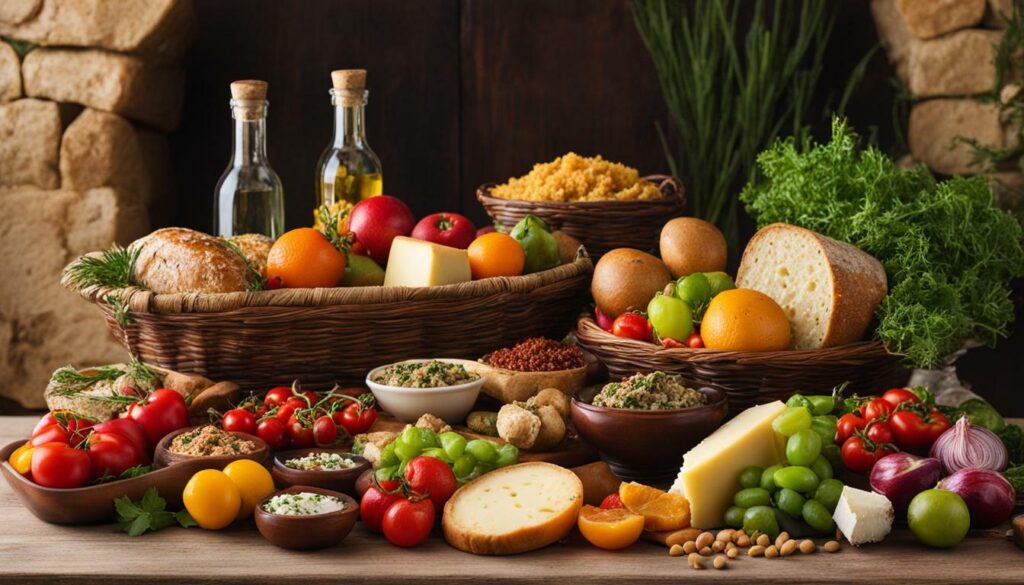Cyprus is a Mediterranean island rich in culinary traditions, where the past and present diets showcase a fascinating blend of cultural heritage and Mediterranean flavours. Understanding the history of food in Cyprus and the significance of traditional foods is crucial to appreciating the country’s unique cuisine.
Key Takeaways
- Cyprus boasts a rich culinary heritage that showcases a blend of cultural influences and Mediterranean flavours.
- The Bank of Cyprus Cultural Foundation and the Cyprus Food and Nutrition Museum have launched a digital museum education programme to explore nutrition in ancient Cyprus.
- The Mediterranean Diet-When Brand Meets People project in Agros aims to strengthen the exploration of the Mediterranean Diet through scientific knowledge and innovation.
- The Cyprus Food and Nutrition Museum organizes gastronomic promenades to explore the connections between cultural heritage and the Mediterranean Diet.
- The Cypriot lifestyle, which emphasizes walking and a good diet, contributes to higher life expectancy and lower disease occurrence.
Traditional Foods of Cyprus
The traditional foods of Cyprus reflect the cultural and historical diversity of the island, with dishes that have been passed down through generations and hold a special place in the hearts of Cypriots. These culinary delights encompass a wide range of flavours and ingredients, showcasing the unique blend of influences that have shaped Cypriot cuisine.
One of the most iconic dishes of Cyprus is the traditional Cypriot meze, a spread of small dishes that are meant to be shared. This gastronomic experience allows diners to savour a variety of flavours, including olives, halloumi cheese, lamb dishes, and an assortment of freshly prepared salads. The meze is a celebration of communal dining and the abundance of locally sourced ingredients.

“The meze is a celebration of communal dining and the abundance of locally sourced ingredients.”
Seafood also features prominently in Cypriot cuisine, thanks to the island’s proximity to the Mediterranean Sea. Grilled fish, octopus stew, and calamari are just a few examples of the delicious seafood dishes that can be enjoyed in Cyprus. The use of olive oil is prevalent in Cypriot cooking, adding a distinct flavour and contributing to the health benefits of the Mediterranean diet.
To truly immerse oneself in the traditional foods of Cyprus, it is important to explore the unique flavours of each region. From the aromatic souvlaki in Nicosia to the sweet and savoury pastries in Limassol, each area has its own specialities that capture the essence of Cypriot gastronomy.
The Diverse Flavors of Cyprus
The cultural heritage and culinary traditions of Cyprus are celebrated through a wide array of dishes, each with its own story to tell. Whether you are indulging in a hearty moussaka, savouring the delicate flavours of a traditional Cypriot salad, or enjoying a cup of locally brewed coffee, you are experiencing the rich tapestry of flavours that Cyprus has to offer.
So, next time you find yourself in Cyprus, be sure to sample the traditional foods that have captured the hearts and palates of Cypriots for generations. From meze to seafood delicacies, each bite will transport you to a world of culinary delights.
History of Food in Cyprus
The history of food in Cyprus dates back centuries, with a rich tapestry of culinary influences from various civilizations that have left their mark on the island’s cuisine. From the ancient Greeks and Romans to the Byzantines, Ottomans, and British, Cyprus has been a melting pot of cultures, and its gastronomy reflects this diverse heritage.
Ancient Cypriots drew inspiration from the abundance of ingredients available on the island, such as olives, grapes, wheat, and goat’s milk. They cultivated vineyards and produced wine, and their diet consisted of fruits, vegetables, legumes, herbs, and wild game.
“The Cypriots were skilled farmers, fishermen, and hunters, gathering an array of ingredients from their natural surroundings,” explains Dr. Elena Tsiplakou, a food historian at the Bank of Cyprus Cultural Foundation.
“Their cuisine reflected not only their resourcefulness but also the influences of neighboring civilizations. Spices from the Middle East, trade with Egypt, and the culinary traditions of the Greeks and Romans all played a role in shaping Cyprus’ gastronomic identity.”
To explore the ancient Cypriot diet and cultural heritage, the Bank of Cyprus Cultural Foundation and the Cyprus Food and Nutrition Museum have launched a digital museum education program called “Something Ancient’s Cooking.” This interactive program allows children to delve into the past and discover the nutritional aspects of ancient Cyprus through engaging activities and visual displays.

Efforts to explore and promote the traditional foods of Cyprus continue today. In Agros, Cyprus, the Mediterranean Diet-When Brand Meets People project aims to strengthen the exploration of the Mediterranean Diet through sharing scientific knowledge, strengthening partnerships, and promoting innovation and creativity in products.
The Cyprus Food and Nutrition Museum also organizes gastronomic promenades to explore the connections between different types of cultural heritage and the Mediterranean Diet. Traditional recipes from Agros have been identified and recorded, preserving the culinary traditions of the region. Additionally, wellness camps are organized to promote healthy eating and well-being among the Cypriot population.
The Cypriot lifestyle itself contributes to the overall health and well-being of the island’s inhabitants. The emphasis on walking and a good diet, rich in fresh fruits and vegetables, seafood, and the renowned Cypriot olive oil, has been linked to higher life expectancy and lower disease occurrence.
Ancient Cypriot Recipes
| Recipe | Main Ingredients | Description |
|---|---|---|
| Cypriot Halloumi Salad | Halloumi cheese, tomatoes, cucumber, olives | A refreshing salad featuring the famous Cypriot cheese, halloumi, paired with fresh vegetables and olives. |
| Loukoumades | Flour, yeast, honey | A traditional Cypriot dessert made of fried dough balls drizzled with honey, a sweet treat enjoyed on festive occasions. |
| Moussaka | Eggplant, potatoes, ground meat, béchamel sauce | A classic Cypriot dish featuring layers of eggplant, potatoes, and seasoned ground meat, topped with a creamy béchamel sauce. |
The history of food in Cyprus is a testament to the island’s rich cultural heritage, blending influences from various civilizations to create a unique and flavorful cuisine. From ancient times to the present day, Cypriot gastronomy continues to evolve, preserving traditional recipes while embracing innovation and creativity.
The Mediterranean Diet in Cyprus
The Mediterranean Diet has long been embraced in Cyprus, with its abundance of fresh ingredients and a focus on simple, wholesome cooking methods. Cypriot cuisine is characterized by a harmonious blend of traditional and modern elements, making it a unique culinary experience.
The traditional foods of Cyprus form the foundation of the Mediterranean Diet, which is recognized as one of the healthiest diets in the world. The Cypriot diet emphasizes the consumption of fresh fruits and vegetables, seafood, whole grains, legumes, and the liberal use of olive oil. These staple ingredients provide a rich source of essential nutrients and antioxidants, contributing to overall well-being and longevity.

According to the Bank of Cyprus Cultural Foundation and the Cyprus Food and Nutrition Museum, initiatives such as the “Something Ancient’s Cooking” digital museum education program have been launched to explore the nutrition in ancient Cyprus. This interactive program allows children to engage with the ancient Cypriot diet and cultural heritage, fostering an appreciation for the importance of food in history.
The promotion of the Mediterranean Diet in Cyprus goes beyond education. Projects like the Mediterranean Diet-When Brand Meets People in Agros showcase the collaboration between scientific research, partnerships, and innovation to further explore and celebrate the Mediterranean Diet. Gastronomic promenades organized by the Cyprus Food and Nutrition Museum also provide an opportunity to connect cultural heritage with the culinary traditions of Cyprus.
In conclusion, the Mediterranean Diet continues to play a significant role in the dietary habits of Cyprus. With its emphasis on fresh ingredients, simple cooking methods, and the preservation of cultural heritage, the Mediterranean Diet in Cyprus offers a pathway to both health and culinary enjoyment.
Exploring Cultural Heritage and the Mediterranean Diet
The vibrant cultural heritage of Cyprus is intricately intertwined with its gastronomic traditions, with festive foods, popular dishes, and culinary creations that have become synonymous with the island’s identity. From traditional village feasts to beloved family recipes passed down through generations, Cypriot cuisine is a testament to the rich history and diverse influences that have shaped the island’s food culture.
One such initiative that explores the connections between cultural heritage and the Mediterranean Diet is the digital museum education program called “Something Ancient’s Cooking” launched by the Bank of Cyprus Cultural Foundation and the Cyprus Food and Nutrition Museum. This program allows children to interact with the ancient Cypriot diet and cultural heritage, offering a fascinating exploration of nutrition in ancient Cyprus.
In the picturesque village of Agros, Cyprus, the Mediterranean Diet-When Brand Meets People project aims to strengthen the exploration of the Mediterranean Diet. Through the sharing of scientific knowledge, the project aims to strengthen partnerships, promote innovation and creativity of products, and encourage a deeper understanding of the Mediterranean Diet. The project also identified and recorded traditional recipes from Agros, further preserving the culinary heritage of Cyprus.
Additionally, wellness camps have been organized to promote healthy eating and well-being in Cyprus. These camps provide an opportunity for participants to learn about the importance of a balanced diet and engage in activities that promote physical health. With a focus on the Cypriot lifestyle, which emphasizes walking and a good diet, these initiatives contribute to higher life expectancy and lower disease occurrence among the population.
| Festive Foods in Cyprus | Popular Foods of Cyprus | Famous Foods in Cyprus |
|---|---|---|
| Koupepia (Stuffed Grape Leaves) | Halloumi Cheese | Cyprus Meze |
| Koulouri (Sesame Bread Rings) | Sheftalia (Grilled Sausages) | Cypriot Souvla |
| Treats like Kattimerka (Honey Cakes) | Keftedes (Meatballs) | Tsipouro (Traditional Drink) |
The colourful tapestry of Cyprus’ cultural heritage is further brought to life through gastronomic promenades organized by the Cyprus Food and Nutrition Museum. These promenades provide an opportunity for locals and visitors to explore the connections between different types of cultural heritage and the Mediterranean Diet. Participants can immerse themselves in the culinary delights of the island, savouring the flavours and aromas of traditional Cypriot dishes.

The culinary landscape of Cyprus is a testament to the island’s rich history and vibrant cultural heritage. Through initiatives and partnerships that promote exploration and creativity, traditional foods in Cyprus continue to evolve and thrive. From festive foods to popular dishes, the diverse flavours of Cyprus are cherished and celebrated, preserving the legacy of this Mediterranean gem.
Promoting Healthy Eating and Well-being in Cyprus
Cyprus recognizes the importance of healthy eating and well-being, with initiatives that aim to educate and inspire individuals to embrace a balanced and nutritious diet. The country’s commitment to promoting healthy living can be seen through various programs and events that encourage the exploration of Cyprus food dishes, meals, and recipes.
One notable initiative is the “Something Ancient’s Cooking” digital museum education programme launched by the Bank of Cyprus Cultural Foundation and the Cyprus Food and Nutrition Museum. This innovative program allows children to interact with the nutrition in ancient Cyprus, diving into the rich cultural heritage and exploring the culinary traditions of the past.
Another project that has made significant strides in promoting healthy eating is the Mediterranean Diet-When Brand Meets People initiative in Agros, Cyprus. This project focuses on strengthening partnerships, sharing scientific knowledge, and fostering innovation and creativity in products related to the Mediterranean Diet. Through gastronomic promenades and the identification and recording of traditional recipes from Agros, the project aims to showcase the connections between cultural heritage and the benefits of a balanced diet.
To further promote healthy eating and well-being, wellness camps have also been organized in Cyprus. These camps provide an immersive experience where participants can learn about the importance of nutrition and engage in activities that support overall well-being. The emphasis on a good diet, combined with the Cypriot lifestyle that encourages walking, contributes to the population’s higher life expectancy and lower disease occurrence.

In conclusion, Cyprus’s dedication to promoting healthy eating and well-being is evident through various initiatives focused on educating and inspiring individuals to embrace a balanced and nutritious diet. Through programs like the “Something Ancient’s Cooking” digital museum education programme and the Mediterranean Diet-When Brand Meets People project, Cyprus is actively exploring its rich cultural heritage and culinary traditions. By prioritizing wellness camps and emphasizing a good diet, Cyprus is setting an example for other nations in fostering healthy lifestyles.
The Impact of Lifestyle on Health in Cyprus
The Cypriot lifestyle, characterized by an active routine and a diet rich in fresh ingredients, has been linked to the population’s better health outcomes and longevity. The emphasis on walking and physical activity, combined with a traditional diet that includes an abundance of fruits, vegetables, seafood, and olive oil, contributes to the overall well-being of the Cypriot people.
“The Cypriot lifestyle promotes a holistic approach to health, with an emphasis on maintaining an active lifestyle and consuming nutritious foods,” says Dr. Maria Georgiou, a nutrition expert at the Cyprus Food and Nutrition Museum. “The combination of regular physical activity and a diet rich in antioxidants and healthy fats has been associated with a lower risk of chronic diseases, such as heart disease and certain types of cancer.”
Research has shown that the Mediterranean diet, which forms the basis of Cypriot cuisine, is one of the healthiest diets in the world. The consumption of fresh, locally sourced ingredients and the avoidance of processed foods and added sugars contribute to the overall health of the population. Additionally, the Mediterranean diet has been found to have anti-inflammatory properties, which can help reduce the risk of chronic inflammation-related diseases.

The promotion of healthy eating and well-being is a priority in Cyprus. Initiatives such as wellness camps and educational programs aim to educate the population, especially young people, about the importance of making nutritious food choices and leading an active lifestyle. These efforts, coupled with the preservation and exploration of traditional recipes and cultural heritage, contribute to the overall health and vitality of the Cypriot community.
Table: Health Benefits of the Cypriot Lifestyle
| Health Benefit | Description |
|---|---|
| Lower risk of chronic diseases | The combination of regular physical activity and a diet rich in antioxidants and healthy fats reduces the risk of conditions like heart disease and certain types of cancer. |
| Anti-inflammatory properties | The Mediterranean diet, which forms the basis of the Cypriot lifestyle, has been found to have anti-inflammatory properties, helping to mitigate chronic inflammation-related diseases. |
| Improved overall well-being | Leading an active lifestyle and consuming nutritious foods contribute to improved physical and mental well-being, enhancing the quality of life for individuals in Cyprus. |
Exploring Ancient Cypriot Diet and Cultural Heritage
Organizations in Cyprus are dedicated to uncovering the ancient Cypriot diet and preserving the cultural heritage associated with traditional foods. The Bank of Cyprus Cultural Foundation and the Cyprus Food and Nutrition Museum have launched a digital museum education program called “Something Ancient’s Cooking.” This innovative program aims to explore the nutrition in ancient Cyprus and allow children to interact with the ancient Cypriot diet and cultural heritage.
One notable initiative in Agros, Cyprus is the Mediterranean Diet-When Brand Meets People project. This project seeks to strengthen the exploration of the Mediterranean Diet by sharing scientific knowledge, strengthening partnerships, and promoting innovation and creativity with products. Through this project, traditional recipes from Agros have been identified and recorded, allowing for the preservation and celebration of the culinary heritage of Cyprus.
“Something ancient’s cooking” allows children to interact with the ancient Cypriot diet and cultural heritage.
The Cyprus Food and Nutrition Museum also plays a vital role in exploring and promoting the connections between different types of cultural heritage and the Mediterranean Diet. The museum organizes gastronomic promenades, providing educational and immersive experiences to visitors. These promenades offer a unique opportunity to delve into the rich history and traditions associated with traditional foods in Cyprus.
Furthermore, initiatives such as wellness camps have been organized in Cyprus to promote healthy eating and well-being. These camps aim to educate participants about the benefits of a balanced diet and an active lifestyle. The Cypriot lifestyle, which emphasizes walking and a good diet, contributes to higher life expectancy and lower disease occurrence among the population.

| Ancient Cypriot Diet | Cultural Heritage |
|---|---|
| Fruits and vegetables | Preservation of traditional recipes |
| Seafood | Gastronomic promenades |
| Olive oil | Cyprus Food and Nutrition Museum |
In conclusion, the exploration of the ancient Cypriot diet and the preservation of the cultural heritage associated with traditional foods are of utmost importance in Cyprus. Through the efforts of organizations like the Bank of Cyprus Cultural Foundation and the Cyprus Food and Nutrition Museum, the ancient diet and culinary traditions are being brought to life, allowing for a deeper understanding and appreciation of Cyprus’ rich gastronomic history.
Culinary Innovations and Partnerships in Cyprus
Cyprus is a hub of culinary innovations and partnerships, where chefs, producers, and organizations collaborate to showcase the diversity and creativity of traditional foods. One notable initiative is the digital museum education program called “Something Ancient’s Cooking,” launched by the Bank of Cyprus Cultural Foundation and the Cyprus Food and Nutrition Museum. This program allows children to engage with the ancient Cypriot diet and cultural heritage, creating an interactive learning experience.
In Agros, Cyprus, the Mediterranean Diet-When Brand Meets People project aims to further explore the Mediterranean Diet by sharing scientific knowledge, strengthening partnerships, and promoting innovation and creativity in food products. This initiative encourages collaboration between stakeholders, including chefs, producers, and researchers, to advance the understanding and appreciation of traditional Cypriot cuisine.
As part of their efforts, the Cyprus Food and Nutrition Museum organizes gastronomic promenades that offer an immersive exploration of the connections between different cultural heritages and the Mediterranean Diet. Through these promenades, participants can discover the historical significance of traditional recipes from Agros, which are identified and recorded to preserve their authenticity.
In addition to these initiatives, wellness camps are organized in Cyprus to promote healthy eating and well-being. These camps educate participants about the benefits of a balanced diet and offer practical guidance on incorporating traditional Cypriot foods into daily meals. The emphasis on fresh fruits and vegetables, seafood, and the use of olive oil, which are key elements of the Mediterranean Diet, contributes to the overall well-being of the Cypriot population.
| Key Initiatives in Cyprus: |
|---|
| “Something Ancient’s Cooking” program by the Bank of Cyprus Cultural Foundation and the Cyprus Food and Nutrition Museum |
| Mediterranean Diet-When Brand Meets People project in Agros |
| Gastronomic promenades organized by the Cyprus Food and Nutrition Museum |
| Wellness camps promoting healthy eating and well-being |
These initiatives not only preserve and promote the traditional foods of Cyprus but also contribute to the overall appreciation of the cultural heritage associated with local cuisine. Through culinary innovations and partnerships, Cyprus continues to embrace its rich gastronomic traditions while adapting to the evolving tastes and preferences of the modern world.

Conclusion
The past and present diets of Cyprus offer a fascinating insight into the cultural heritage, culinary traditions, and vibrant flavours that define the island’s gastronomy. As a country rich in history, Cyprus has a diverse range of traditional foods that reflect its unique blend of influences from various Mediterranean cultures.
The Cyprus National Food, often referred to as the island’s culinary emblem, is a national point of pride. It represents the essence of Cypriot cuisine, showcasing the use of fresh ingredients, unique spices, and traditional cooking methods. From mouth-watering souvlaki and hearty moussaka to the beloved Cypriot cheese haloumi, the traditional foods of Cyprus capture the authentic flavours of the region.
Exploring the history of food in Cyprus reveals the deep roots of its cuisine. The island’s culinary heritage is shaped by centuries of influences from Greek, Turkish, Arabic, and Venetian cultures. Each dish carries a story, and the traditional recipes passed down through generations showcase the rich tapestry of Cypriot food history.
The Mediterranean Diet, which forms an integral part of Cypriot cuisine, emphasizes the consumption of fresh fruits and vegetables, seafood, and the use of olive oil. This diet has garnered worldwide recognition for its health benefits and is deeply intertwined with the cultural heritage of Cyprus. Going beyond just nutrition, the Mediterranean Diet is a way of life that promotes overall well-being and longevity.
Efforts to promote healthy eating and preserve Cyprus’ culinary heritage are ongoing. The Bank of Cyprus Cultural Foundation and the Cyprus Food and Nutrition Museum have launched educational programs and initiatives that explore the ancient Cypriot diet and cultural heritage. In Agros, the Mediterranean Diet-When Brand Meets People project aims to strengthen partnerships, foster innovation, and promote the exploration of the Mediterranean Diet.
FAQ
What is the “Something Ancient’s Cooking” programme?
The “Something Ancient’s Cooking” programme is a digital museum education programme launched by the Bank of Cyprus Cultural Foundation and the Cyprus Food and Nutrition Museum. It aims to explore the nutrition in ancient Cyprus and allows children to interact with the ancient Cypriot diet and cultural heritage.
What is the Mediterranean Diet-When Brand Meets People project?
The Mediterranean Diet-When Brand Meets People project is an initiative in Agros, Cyprus. It aims to strengthen the exploration of the Mediterranean Diet through sharing scientific knowledge, strengthening partnerships, and promoting innovation and creativity of products.
What are gastronomic promenades?
Gastronomic promenades are organized by the Cyprus Food and Nutrition Museum to explore the connections between different types of cultural heritage and the Mediterranean Diet. These promenades involve exploring traditional recipes from Agros and identifying and recording them.
What is the purpose of the wellness camp?
The wellness camp is organized to promote healthy eating and well-being. It is aimed at educating participants about the importance of a balanced diet and healthy lifestyle choices.
What is the Cypriot lifestyle like?
The Cypriot lifestyle emphasizes walking and a good diet, which contributes to higher life expectancy and lower disease occurrence among the population.
What are the prevalent foods in the Cypriot diet?
Fresh fruits and vegetables, seafood, and olive oil are prevalent in the Cypriot diet. However, smoking is also widespread in Cyprus.
Source Links
- https://u.osu.edu/nursingcyprus2023/
- https://mediterraneandietunesco.org/communities/cyprus/cyprus-initiatives/
- https://www.cbn.com.cy/article/2023/8/7/726495/something-ancients-cooking-an-educational-dietary-journey-in-ancient-cyprus/



